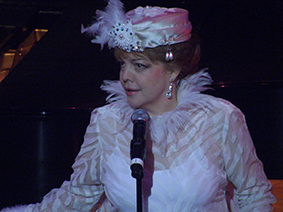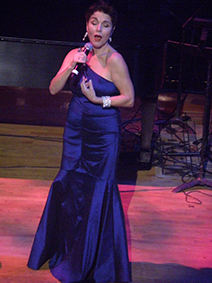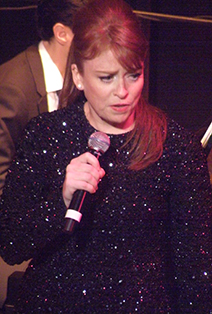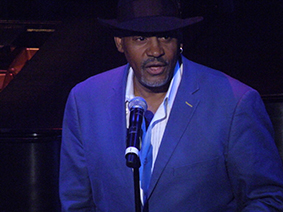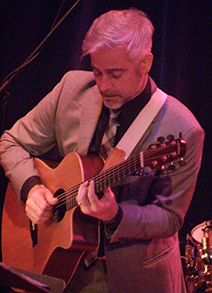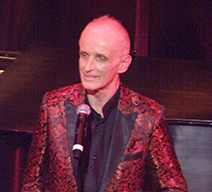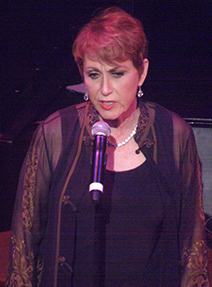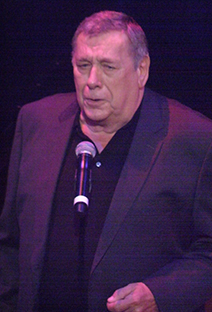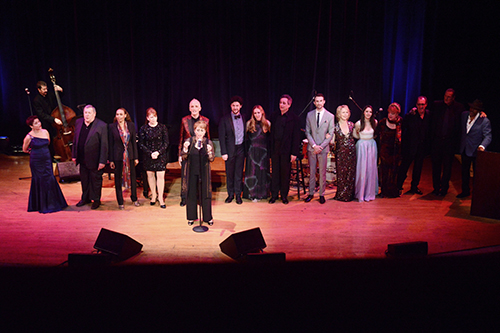26th Annual NY Cabaret Convention: Gala Opening Night
26th Annual New York Cabaret Convention
Gala Opening Night
The Town Hall, NYC, October 13, 2015
Reviewed by Rob Lester for Cabaret Scenes
Photos by Maryann Lopinto
“Another op’nin’, another show….” were the first words we heard at another opening of yet another show, this one not just the show’s opening, but the series’ opening. That series is the annual October Cabaret Convention—the 26th season, to be precise. The words were sung with flair and a wink by our hostess, KT Sullivan, a vision in white complete with feathered hat for glamour. She’s the Artistic Director of the Mabel Mercer Foundation, the sponsoring organization of the concerts and other events. The words (and music) are by Cole Porter, the writer so often chosen by cabaret singers. Christine Andreas took a page from Porter’s prodigious songbook, too, when her prime spot turn came, choosing his “I Love
Paris.” A pro to her toes, with a focused charisma, she used the whole stage, moving about, as her rich voice filled the air. In addition to these two veterans, a relative newcomer to cabaret also turned to Porter. With a twinkle in his eyes below raised eyebrows, Joshua Dixon—who’s won rave reviews (including this writer’s in this magazine/website) in addition to winning two cabaret awards for his debut show— captivated with “Experiment” (“Make it your motto day and night….Be curious/ Though interfering friends may frown…”). His own experiment was to integrate an old rock song into the Porter playfulness, the Jefferson Airplane number “White Rabbit,” with its allusions to Alice in Wonderland characters and experimentation with drugs. It may have been a jolt to those unlucky enough not to have seen this
in the context of his cabaret show at The Duplex in Greenwich Village. His other selection was a spot-on version of “Giants in the Sky” by Stephen Sondheim. That writer, like Porter, goes hand in hand with cabaret artists and one of the opening night’s other standouts, Maxine Linehan, dug into his “Not a Day Goes By” with an appropriately anguished yet mature rendition. Ms. Sullivan and Jeff Harnar, co-host of the Convention’s second evening, are currently performing Sondheim is a show a few blocks away from The Town Hall—at the Laurie Beechman Theatre—and they keep getting extended.
There’s been much conversation about conservatism versus contemporary song adventurousness in expanding The Great American Songbook with a kind of Volume 2. The Convention congregation includes many longtime attendees who are old enough to remember the days of the World War II songs featured in Wednesday’s show and, like returning soldiers, some come back to the Mabel Mercer Foundation’s concerts for the comforts of musical home fires rekindled. From the tradition of featuring traditional material being the main and virtually only course that proudly we served them, that’s what they’ve come to expect—and why they’ve come.
While want that time machine flashback experience, others welcome time, like soldiers, marching on. But one can feel some restlessness in the rest of the crowd when pop, rock, and folk music is incorporated. It’s risky. Ideally, a cabaret singer with a great arranger makes an old song or a newer song sound…timeless. Material can sometimes be reshaped and deepened, a fresh approach or change in tempo can put a different emphasis on a line we know like the lines annoyingly gathering around our eyes and our eyes alight with new thoughts. A song not in the typical cabaret tradition can, in the right hands of the right pianist can be cabaret-transformed in the best kind of identity theft and some singers can make similar magic by finding the lurking beauty or drama that makes it a story. Some material resists change and some singers resist changing the material, just as some audience members are turned off by the very dense or very simple (and repetitive) lyrics and melodic structures. “Convention”-al wisdom suggests that the Convention crowd is conservative and wants something more along the lines of a reincarnation of cabaret queen Mabel Mercer herself, relishing intelligent and witty lyrics. Nostalgiaphiles seek the music of their youth that has stood the test of time, not unlike themselves. But let’s not over-generalize or over-react. There are 20-somethings who wish they were born in the Golden Age and love discovering it and there are some white-haired fans who cheer on what came on the scene in the 1960s, ’70s, and beyond that didn’t sound like it could have been written before.
In the case of opening night, FYI—after KT blended Porter and another iconic songwriter’s iconic anthem, Irving Berlin’s “There’s No Business Like Show Business,” followed by mellow minimalist Allan Harris (whose rendition of the Billy Strayhorn gem “Something to Live For” was near-exquisite—something “to die for” if you will, but it was too early to die. There was plenty of show left).
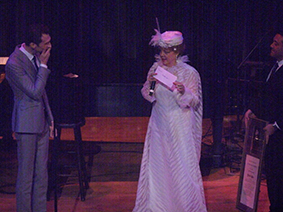
KT Sullivan surprised Kristoffer Lowe by presenting him with The Julie Wilson Award, which is underwritten by Linda and Peter Hanson.
After KT and Mr. Harris (not the “Mr. Harris, plutocrat who likes to give my cheek a pat” has been known to sing about in a different Cole Porter number from Kiss Me, Kate), there was a long stretch of time before we returned to tradition. Then, as it happened, a younger singer with the right stuff that spells talent came in with older stuff. It was Kristoffer Lowe, winner of recent cabaret awards and the Metropolitan Room’s annual singing contest. The MetroStar star was right on the money and astute with two cute money songs blended, samples from his current act is all songs with melodies by Harry Warren, the most represented composer of the Hit Parade era who also had a habit of being nominated for and winning the Academy Award for movie song of the year, back in the day. “We’re in the Money” and “With Plenty of Money and You” were, well, like money in the bank and these numbers about the delights of cash were done with panache and pluck. Kristoffer Lowe also scored with a switch to the utmost seriousness after his gleeful pep rally, with “The Impossible Dream.” Then, he got a surprise dream come true when KT returned to tell him he was being presented with the Julie Wilson Award, a happy occasion, but sadly the first year that this honor had to come after the passing of the beloved cabaret legend that bears the award’s name.
Pre-Lowe, there were low points for those wanting more of the same old old songs. But certainly some breathed their own sigh of relief when a different note was sounded, and different colors came into view. Lauren Fox, who’s won cabaret awards for her Leonard Cohen and Joni Mitchell explorations, came in with more off-the-beaten-path material. Would the audience be rolling with the punches when a Rolling Stones item came along. Fox rocks? Not quite. “Wild Horses” was a horse of a different color, but more mournful than rhythmic or abrasive/loud. The vocal harmonies with her musicians were glorious and she had three of the best—guitarist Peter Calo and bassist Ritt Henn—as well as pianist supreme Jon Weber.
Karen Oberlin, who audiences know as a regular and has charmed over the years with oldies from Frank Loesser’s songbook and her Doris Day tribute show is currently riding the wave of her show with the songs of Elvis Costello, a favorite from HER youth. So one of those, with the downbeat subject matter of dementia, was presented. And Paul Simon’s “Train in the Distance” was the other non-Songbook ride she took us on. While not everyone may have been willing to go along for the ride, I found them quite mesmerizing. However, there’s something to be said for the advice and request given to singers auditioning for a role in a musical: Sing two contrasting songs. That typically means a ballad and an uptempo. Belt and croon. Show your versatility. A Cabaret Convention appearance where you get a chance to sing two songs is like an audition if the audience doesn’t know your work. Are you a one-trick pony or a musical magician with many tricks up the sleeve? Would the audience sampling your wares be wary sameness of material would wear thin? Variety is the spice of life, someone said. Maybe it was a writer working for Variety, the show biz trade.
Rebekah Lowin was loveliness personified. The newcomer to cabaret, just graduated from Columbia, is a breath of fresh air. The soprano sold two pieces that were perhaps two alike but easy to like. Both warm and gentle, they were not from the Songbook, but rather things that are traditional in another way: “The Water Is Wide” and “Auld Lang Syne,” with a disarming vocal/guitar solo by the superb Peter Calo. Fresh from her Eva Cassidy tribute, she having only one four-minute spot offered to be a “spot on” performer in less time in the spotlight means having to score a bull’s eye without the luxury or danger of two contrasting full numbers. Thus, the mashup or medley can save the day, but the right arrangement of one item can present the necessary change. And a master of audience pleasing can score with no more than one song. Such a pro in the know is longtime audience-pleaser Sidney Myer. With his pseudo-courtly and grand manner with his trademark introduction of “Any night is a grand night for singing when seated at the Steinway…” (Pause) “or reasonable facsimile…” before he acknowledges his own award-winning accompanist, the versatile Tracy Stark. This year, the guy who is a comic wizard had as his proffered delectable bon-bon “No Ring on Her Finger,” a quaint-sounding tale of woe about the aging gal who never gets a wedding ring, “only the rings under her eyes.” Played for the maximum comic potential of the laughs from its puns and pastiched melodrama, the Myer master of expert timing as the audience waited for the next pun in smiling silent contract with the performer was a joy to behold. “No Ring on Her Finger” let mercurial Mr. Myer ring the bell with a knockout punch, the Frank Loesser/Manning Sherwin oddity from the 1937 film Blossoms on Broadway blossoming into full-flowered glory.
Also outside the national borders of the strictly American Songbook were some songs and/or performers born abroad. Stefan Bednarczyk, providing his own accompaniment, took a page from cabaret’s favorite English man, Noel Coward, with the tale of the newly widowed lady letting loose on vacation and drinking up and living it up in “A Bar on the Piccoloa Marina.” Frans Bloem brought a tour of Charles Aznavour via his dramatic “La Boheme.”
Christine Andreas’ set brought more French with two Edith Piaf standbys she does with commanding comfort—the signature “La vie en rose” and the rowdy and lively “Milord” which showed her theater chops. Rather than just plainly give a thumbnail sketch of the lyric’s storyline, she instantly became the character in attitude and stance and voice giving a mini-version in English. And she used her whole body and the width of stage when she performed it full out. C’est fantastique! It is, after all, Edith Piaf’s centenary. It’s also Billie Holiday’s hundredth birthday and Vivian Reed chose Lady Day’s mantra “God Bless the Child” for a stylized turn, owning the song, owning the stage, owning the audience.
The evening’s end came with a set by singer-songwriter Amanda McBroom and friends —and family. She won the Mabel Mercer Award and entertained with her customary grace and intensity, along with pianist and songwriting partner Michele Brourman. And to sing one of her numbers, from her Heartbeats musical in which she’d cast him, was her husband, George Ball. Garnering one of the most appreciative and longest hands of the evening, his dignified and moving piece about a longtime marriage was a highlight. “Know your audience” was a watchcry well employed here. It’s not just the longtime-married couple on stage together in life imitates art imitating life, but also present was a bonding—between artist and audience, singer and songwriter, songwriter and audience. That last-named bond was cemented when the most famous McBroom creation was led the writer who was joined by the company—and some audience members—for the evening’s finale. As they gathered to sing “The Rose” we were reminded how fragile and beautiful cabaret can be, like a rose, like love, and the love for cabaret filled the room.
Many were are ready and set to go to the next night’s cavalcade of decidedly traditional fare, as it was designed specifically to be all World War II material. The Thursday concert is all the oeuvre of Kander & Ebb, who, after all, wrote the song titled “Cabaret” for the musical set in one. Friday’s closing night is a double dose of composers, highlighting Vernon Duke and Marvin Hamlisch.
As folks drifted into the lobby where they could purchase CDs by the evening’s artists and other singers to keep the music going at home and pick up a free copy of this website’s companion magazine, Cabaret Scenes, to “read all about it.”
Category: Cabaret Reviews, Music, Music Features, New York City, New York City Cabaret Features, New York City Cabaret Reviews

